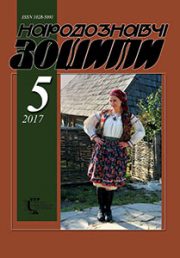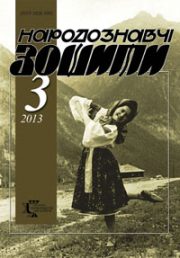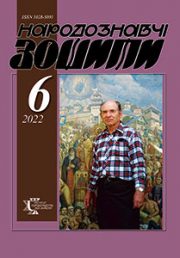The Ethnology Notebooks. 2024. № 3 (177), 699—715
UDK [572:639.1](68)
DOI https://doi.org/10.15407/nz2024.03.699
ZOMBEK Maciej
- ORCID ID: htpps://orcid.org/0000-0003-2337-3064
- Habilitated doctor, professor, director,
- The Institute of Ethnology and Cultural Anthropology
- University of Warsaw,
- Krakivske Predmistia Street, 28/26, 00-927,
- Warsaw, Poland,
- Contacts: e-mail: m.zabek@uw.edu.pl
Abstract. The purpose of the article is a critical discussion of some current problems of modern socio-cultural anthropology in connection with the research of Bushmen — African huntergatherers of the Kalahari basin, which for more than three decades have been the subject of scientific interests of the outstanding British scientist Alan Barnard. The subject of the study is a wide range of issues related to the observance of political correctness in the coverage of complex ethnological issues, the perception of Bushmen by the peoples of the Western world, the origin and evolution of man, the role of Neanderthals in the evolutionary history of mankind, the nature of modern man, etc.
The results of the research: it is claimed that ethnographic observations were used by Alan Barnard to justify a number of provisions of his own anthropological concept, which relate to the ancestral homeland of mankind, the factors of the process of anthropogenesis of Neanderthals belonging to the biological species Homo sapiens, intraspecies divergence of man, etc. The scientist proposed his own vision of the cause of Neolithic shifts in human history and was inclined to recognize the concept of the immutability of human nature, which implies the hereditary nature of human behavior and the deep rootedness of the cultural achievements of modern ethnic communities.
Alan Barnard’s works reflect modern trends in the development of social anthropology.
The research methodology is based on the complex involvement of various methods, principles and concepts
Keywords: anthropology, Alan Barnard, Bushmen, political correctness, Neolithic revolution, evolution and human nature.
Received 26.06.2024
REFERENSES
- Barnard, A. (2006). Anthropology. Outline of theory and history. Warszawa: PIW [in Polish].
- Barnard, A. (2022). Social anthropology and the origin of man. Siara; Warszawa: NCK [in Polish].
- Hammond-Tooke, W.D. (1997). Imperfect Interpreters: South Africa’s Anthropologists, 1920—1990. Johannesburg: Witwatersrand University Press.
- Eiselen, W.W.M. (1934). Christianity and the Religious Life of the Bantu. In: Western Civilization and the Natives of South Africa. London: Routledge and Kegan P.
- Eiselen, W.W.M. (1929). Stamskole in Suid-Afrika: ‚n Ondersoek oor die Funksie daarvan in die lewe van die Suid-afrikaanse stamme. Johannesburg: Published by J.L. van Schaik.
- Schoema, P.J. (1982). Hunters of the Desert Land. Johannesburg: Howard Timmins.
- Schoeman, P.J. (1941, june). Territoriale Segregasie: Enigste Doeltreffende Naturelle beleid vir Suid-Afrika. Wapenskou (Pp. 20—31, 34).
- Gordon, R. Apartheid’s Anthropologists: The Genealogy of Afrikaner Anthropology. American Ethnologistm, 3 (Vol. 15, pp. 535—553).
- Coertze, P.J. (Ed.). (1965). Inleiding tot die Algemene Volkekunde. Johannesburg: Published by Voortrekkerpers.
- Coertze, R.D. (1978). Teorie en Navorsing. Suid-Afrikaanse Tydskrif vir Etnologie, 2, 9—20.
- Coertze, P.J. (1961). Referaat. Gedifferensieerde Ontwikkeling (Pp. 16—24). Pretoria: Afrikaanse Studente Bond.
- The University of Edinburgh, School of Social and Political Science. Retrieved from: https://www.sps.ed.ac.uk/news-events/news/alan-barnard (Last accessed: 15.10. 2022).
- Cavalli-Sforza, L.L. (2009). Introduction. In: Stone L., Lurquin P.F. Genes, culture and human evolution. Warszawa: WUW [in Polish].
- Friedman, J. (2019). PC Worlds. Political Correctness and Rising Elites at the End of Hegemony. Oxford: Berghahn Books.
- Wilson, E.O. (2002). Consilience. Unity of knowledge. Poznan: Zysk i S-ka Publishing House [in Polish].
- Barnard, A. (2007). Antropology ad the Bushman. Oxford: Berg Publishers.
- Barnard, A. (1989). The Lost World of Laurens van der Post? «Current Anthropolog» (Vol. 30 (1).
- 18. Miller Jones A., van der Post, L. (rez.). Lost World of Kalahari. BBC, 1956. Retrieved from: https://www.youtube.com/watch?v=4umz7CXMUM4 (Last accessed: 10.01.2022).
- Van der Post, L. Interview by Tekweni Television. 2019. Retrieved from: https://www.youtube.com/watch?v=ybSD6eGNHVs (Last accessed: 05.01.2023).
- Lee, R.B. (1979). The Kung San, Men, Women and Work in a Foraging Societey. Cambridge: Cambridge University Press.
- Lubbock, J. The origin of civilization and the primitive condition of man, New York: D. Appleton and Company, 1874.
- Zimon, H. (2001). Primary monotheim. Wilhelm Schmidt’s theory and its criticism at the Vienna ethnological school. Lublin: Scientific Society of the Catholic University of Lublin [in Polish].
- King, B.J. (2017). Evolving God: A Provocative View on the Origins of Religion, Chicago: University of Chicago Press.
- Lee, R.B. (1986). The Gods Must Be Crazy, but the State Has a Plan:Government Policies towards the San in Namibia. Canadian Journal of African Studies, 20 (1), 91—98.
- Klemesrud, J. (1985, 28 april). The Gods Must Be Crazy — A Truly International Hit. The New York Times.
- Liebenberg, L. (1990). The art of tracking: the origin of science. Cape Tow: David Philip.
- Washburn, S.L., & Lancaster, C.S. (1968). The Evolution of Hunting. In: Lee R.B., DeVore I. Man the Hunter. Chicago: Aldine.
- Washburn, S.L. (1978). The Evolution of Man. Scientific American, 3 (Vol. 239).
- Popper, K.R. (1963). Conjectures and Refutations. London: Routledge and Kegan Pau.
- Liebenberg, L. (1990). The art of tracking: the origin of science. Cape Town: David Philip.
- Stent, G.S. (1978). Paradoxes of Progress. San Francisco: W.H. Freeman.
- Piasecki, K. (2010). The problem of races in anthropology. Anthropology of politics and politics in anthropology (Pp. 155—167). Warszawa: Institute of Archeology and Ethnology PANS [in Polish].
- Stringr, Ch., & McKie, R. (1999). African exodus. The origin of modern man. Warsaw Proszynski i S-ka Publishing House [in Polish].
- Piasecki, K., & Wieckowski, W. (2000). Neanderthals. Swiatowit (Vol. II (XLIII), pp. 117—185) [in Polish].
- Conde-Valverde, M, Martнnez, I., & Quam, R.M. et al. (2021). Neanderthals and Homo sapiens had similar auditory and speech capacities. Nature. Ecology and Evolution, 5, 609—615.
- Malinowski, A. (1999). Introduction to anthropology and human ecology (Ed. 2). Lodz: Publishing House of the University of Lodz. [in Polish].
- Piotrowski, R. (2009). From racial knowledge to racism and back. In: Borderlands of science. Protoscience, parascience, pseudoscience, Philosophy of Nature and Natural Sciences (Vol. 3, pp. 325—344). Lublin: Wydawnictwo KUL [in Polish].
- Piasecki, K. (2020). Holocene changes in the anthropological structure of Africa. In: Cultural changes in Africa. History and Anthropology (Pp. 21—60). Warsaw: University of Warsaw Publishing House [in Polish].
- Piasecki, K. (2022). Africans in pre-Columbian Mexico and Peru. In: Dimensions of anthropological understanding of Africa. Sketches from recent research (Pp. 19—50). Warsaw: University of Warsaw Publishing House. [in Polish].
- Dutton, E. (2020). Making Sense of Race. Washington: Summit Publishers.
- Stoczkowski, W. (2009, june). UNESCO’s doctrine of human diversity A secular soteriology? Anthropology Today (Vol. 25 (3).
- Stoczkowski, W. (2007). Racisme, antiracisme et cosmologie Levi-Straussienne. Un essai d’anthropologie reflexive. L’homme, 182, 7—52.
- Shiao, J.L., Bode, T., Beyer, A., & Selvig, D. (2012). The Genomic Challenge to the Social Construction of Race. Sociological Theory, 30 (2), 67—88.
- Bamshad, M.J. et al. (2003). Human population genetic structure and inference of group membership. American Journal of Human Genetics (Vol. 72, pp. 578—589).
- Rosenberg, N.A. et al. (2002). Genetic structure of human populations. Science (Vol. 298, pp. 2381—2385).
- Shriver, M.D. et al. (2004). The genomic distribution of population substructure in four populations using 8,525 autosomal SNP. Human Genomics (Vol. 1, pp. 274—286).
- Watkins, W.S. et al. (2003). Genetic variation among world populations: inferences from 100 alu insertion polymorphisms. Genome Research (Vol. 13, pp. 1607—1618).
- Kuper, A. (2005). Culture. Anthropological model. Krakow: Jagiellonian University Publishing House [in Polish].
- Aiello, L.C., & Wheeler, P. (1995). The Expensive-Tissue Hypothesis: The Brain and the Digestive System in Human and Primate Evolution. Current Anthropology, 36, 199—221.
- Aronson, J.K. (2014). Plant Poisons and Traditional Medicines. Manson’s Tropical Infectious Diseases (Pp. 1128—1150).
- Rodrнguez, Arce, J.M., & Winkelman, M.J. (2021, sep. 29). Psychedelics, Sociality, and Human Evolution. Frontiers in Psychology.
- Sutcliffem, А., Dunbar, R.I.M., Jens Binder, J., & Arrow, H. Relationships and the Social Brain: Integrating Psychological and Evolutionary Perspectives? Retrieved from: https://doi.org/10.1093/acprof:osobl/9780199652594.003.0007 (Last accessed: 12.04.2023).
- O’Regan, S., Molloy, E., Watterson, L., & Nestel, D. (2016). Observer roles that optimise learning in healthcare simulation education: a systematic review. Advances in Simulation volume, 1. Retrieved from: https://doi.org/10.1186/s41077-015-0004-8 (Last accessed: 15.03.2023).
- Hanson, P.J., & Wullschleger, S.D. North American Temperate Deciduous Forest Responses to Changing Precipitation Regimes (Pp. 163—189). New York: Springer; Verlag.
- Stoczkowski, W. (2000). People, gods and aliens from space. Warsaw: National Publishing Institute [in Polish].
- Childe, Vere, G. (2014). The Most Ancient Near East. London: Routledge.
- Childe, Vere, G. (1941). Man makes himself. London: Watts & Co.
- Harris, M. (1983). Cultural Antrhopology. New York: Harper & Row.
- Maher, L.A., Banning, E.B., & Chazan, M. (2011). Oasis or Mirage? Assessing the Role of Abrupt Climate Change in the Prehistory of the Southern Levant. Cambridge Archaeological Journal, 21 (01), 1—30.
- Engels, F. (1982). The role of work in the process of humanizing the monkey. In: Marx K., Engels F. Selected works (Pp. 156—200).Warszawa: KiW.
- Sahlins, M. (1974). Stone Age economics. London: Tavistock Publications.
- Harris, M. (1973). Cultural Antrhopology. New York: Harper & Row.
- Godelier, M. (1972). Rationality and Irrationality in Economics. London; New York: Verso.
- Bird-David, N. (1992). «Beyond» The Original Affluent Society»: A Culturalist Reformulation. Current Anthropology, 33 (1), 25—47.
- Livingston, J.A. (1994). Rogue primate: An exploration of human domestication. Toronto: Key Porter Books.
- Riggs, J.E. (1993). Stone-age genes and modern lifestyle: Evolutionary mismatch or differential survival bias. Journal of Clinical Epidemiology, 46 (11), 1289—1291.
- Giphart, R., & van Vugt, M. (2018). Mismatch: How Our Stone Age Brain Deceives Us Every Day (And What We Can Do About it). London: Little; Brown Book Group.
- Braidwood, R.J., Sauer, J.D., & Helbaek H. (1953). Did Man Once Live by Beer Alone? American Anthropologist (Vol. 55, pp. 515—526).
- Bertman, S. (2005). Handbook to Life in Ancient Mesopotamia. Oxford: University Press.
- Sinclair, T., & Sinclair, C.J. (2010). Bread, Beer and the Seeds of Change: Agriculture’s Imprint on World History. Boston: CABI.
- Hornsey, I.S. (2004). A History of Beer and Brewing. Cambridge: RSC Paperbacks.
- McGovern, P. (2009). Uncorking the Past: The Quest for Wine, Beer, and Other Alcoholic Beverages. Berkeley: University of California Press.
- Stagl, J. (2000). Anthropological universality. On the validity of generalizations about human nature. W: Roughley, N. Being Humans: Anthropological Universality and Particularity in Transdisciplinary Perspectives. Berlin: Walter de Gruyter.
- Wright, G.H. Von. (2021). The Myth of Progress. W: The Tree of Knowledge and Other Essays (Pp. 202—228). Lejda: Brill Publishers.
- Rapport, N. (2018). Human nature: the foundation and hope of anthropology. Second texts, 1, 201—221 [in Polish].
- Levi-Strauss, C. (1969). «Untamed thought». Warsaw: PWN Scientific Publishing House [in Polish].
- Pinker, S. (2002). The Blank Slate. New York: Penguin.
- Wrangham, R.W., & Peterson, D. (1996). Demonic males: Apes and the origins of human violence. Boston: Houghton Mifflin.
- Spiro, M. (1979). Gender & Culture: kibbutz women revisited. Durham: Duke University Press.
- Spiro, M. (2019). Culture and human nature. New York: Routledge.
- Neeman, J. (2012). We were the future. Wolowiec: Publishing House [in Polish].
- Richerson, P.J., & Boyd, R. (2005). Not by genes alone: how culture transformed human evolution. Chicago: University of Chicago Press.
- Wiercinski, A. (1981). Anthropogenesis — the evolution of civilization. Warszawa: SSP Universitas [in Polish].







